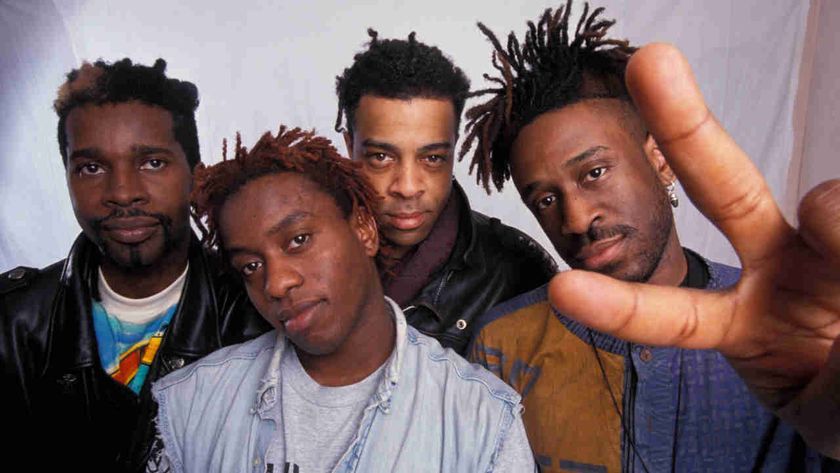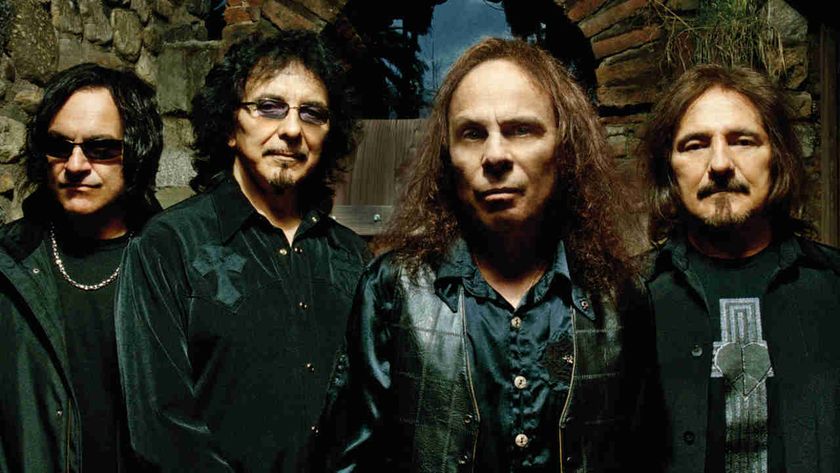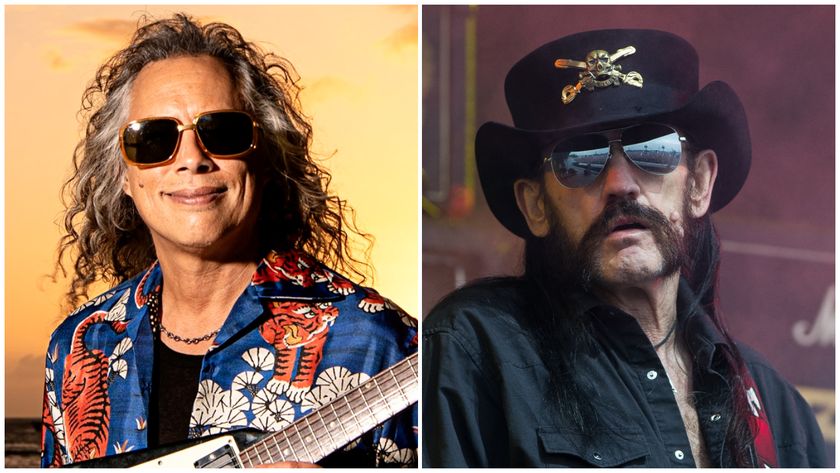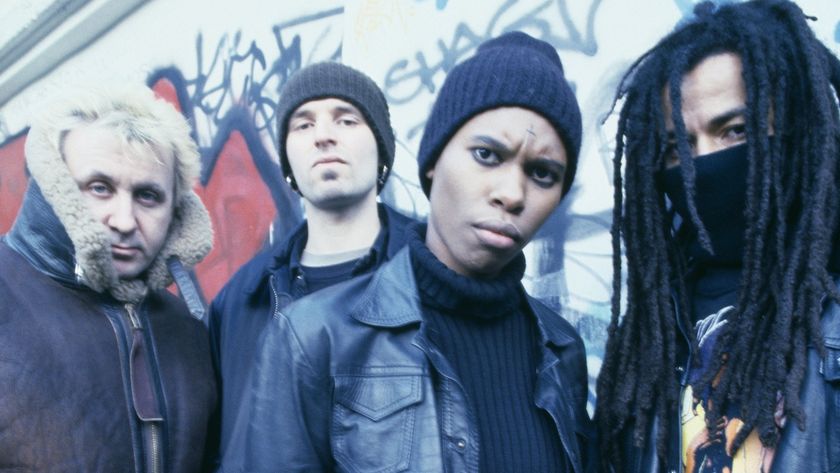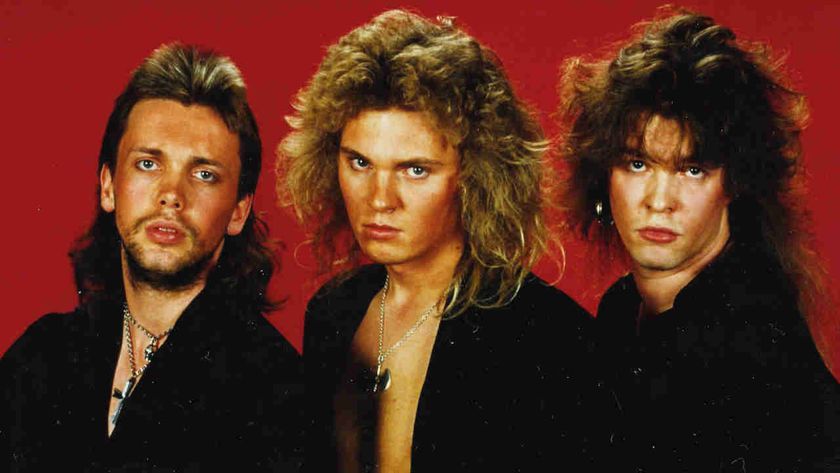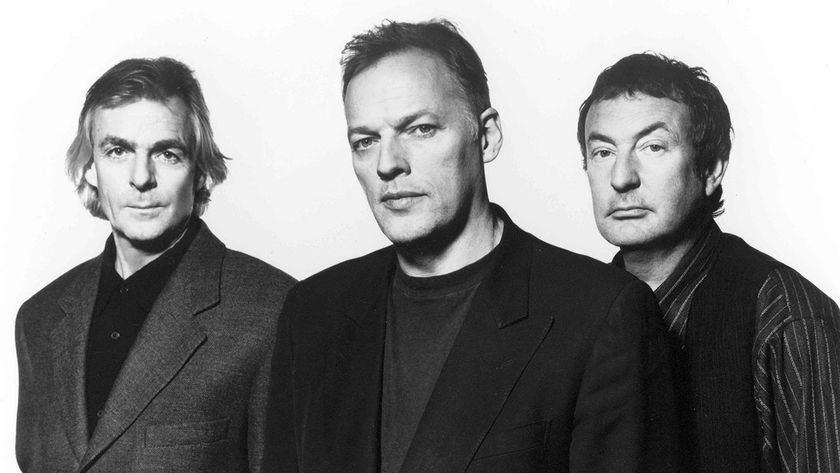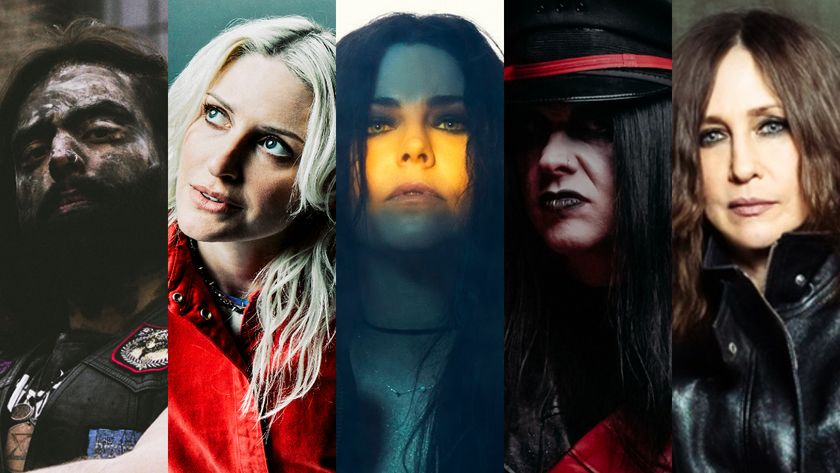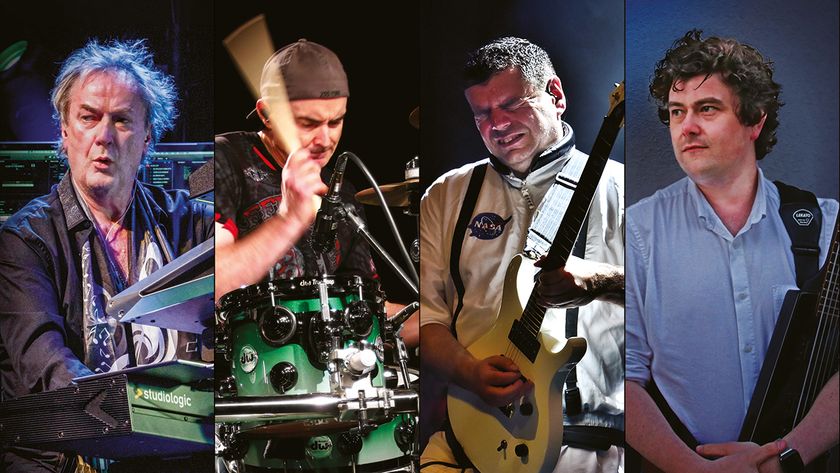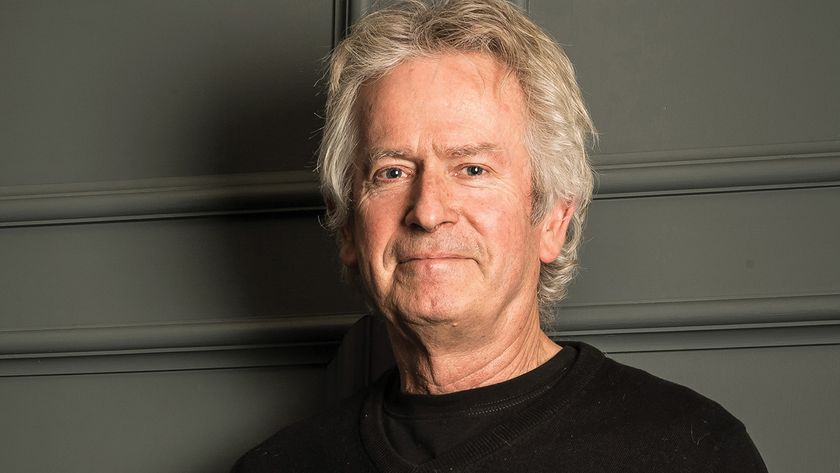50. Jeff Buckley - Grace
You can trust Louder Our experienced team has worked for some of the biggest brands in music. From testing headphones to reviewing albums, our experts aim to create reviews you can trust. Find out more about how we review.
Buckley copycats might mimic the angel voice, but they’re missing the point: the late Californian had eclectic tastes – Zeppelin, Al Di Meola, The Smiths… and his sole album mixed moments of drowsy beauty, So Real, with bombastic rock, Eternal Life, and reworked Middle English hymns, Corpus Christi Carol. “I know I can do better,” said Buckley – but he never got the chance.
“One guitar record I didn’t ‘get’ at first was Jeff Buckley’s Grace," says Halestorm's Lzzy Hale. "But it’s only because, as a singer myself, I was overly distracted by his amazing voice. At first, I considered it more of a vocal album. But as I dug in, I realized that the man was an absolute genius on guitar.”
49. The Clash - The Clash
The Clash was hurriedly-written and recorded and it’s a messy and thrilling snapshot of two creative forces gelling for the first time. From their vocals (Strummer’s yobbish bark balanced by Jones’s boyish sensitivity) to their lyrics (famously, Strummer changed Jones’s track I’m So Bored With You to I’m So Bored With The USA), and even their guitar-playing (Joe’s choppy rhythm guitar versus Mick’s slightly weedy-but-melodic lead), the album is a true Strummer/Jones production. Both men were classic rock’n’roll dreamers. To find themselves in the right time and right place with the perfect partners must have been a buzz and, amid the anger and the outrage, the album captures that rock’n’roll woah perfectly.
The Clash is full of defiance, dark humour and plenty of cheap thrills. Short adrenaline bursts like 48 Hours and Protex Blue (a stupidly laddish ode to the top condom brand of the time: ‘I don’t think it’ll fit my PD drill’) add levity to darker tracks like Deny and Cheat, while Janie Jones, Career Opportunities, London’s Burning and Garageland do all the heavy lifting – full of righteous anger, great one liners and gleeful humour. And that’s not to forget two tracks about race that would define their career: White Riot and Police And Thieves. The first was the sort of full-throttle rabble-rousing punk that would inspire the Oi! movement that followed, the latter was a sign of where The Clash would go next – not just deeper into reggae, but also into other musical styles - with The Clash giving the song steel toe-capped boots and a knuckleduster to create punk-reggae, cementing a relationship between the two genres that continues to this day.
48. Emerson, Lake & Palmer - Emerson, Lake & Palmer
Although this wasn’t strictly the first prog rock album, nor the first by a so-called supergroup, in many ways this record came to epitomise both. Overblown, bombastic, arrogant and egomaniacal it might have been, but it includes the elegiac Take A Pebble and Lucky Man as part of its tracklist.
Written when he was 12 years old, Greg Lake’s Lucky Man elegy to a mythic figure fallen in battle had previously been rejected by King Crimson. Entering the progressive rock pantheon as ELP laid down their debut, Emerson’s improvised Moog solo, recorded in what he thought was a run-through, is truly heroic.
47. Joy Division – Unknown Pleasures
Initially met with a mixed response following its release in 1979, Unknown Pleasures has since become an album of regular critical acclaim. The album’s status as a cornerstone of the post-punk genre is irrefutable and under producer Martin Hannett, the four-piece established Joy Division’s starkly original sound: a compelling and audacious landscape of apocalyptic dread driven by lead singer Ian Curtis’ anguish and Peter Hook’s melodic bass lines. .
Less than a year after the record’s release Curtis committed suicide at the age of 23, further compounding the poignancy of his lyrics.
Hannett employed an array of unorthodox techniques during the album’s production, such as recording Curtis’ vocals for ‘Insight’ through a telephone line. Bottles smashing, someone eating crisps and a basement toilet were amongst some of the sound effects used, as well as the Powertran Transcendent 2000 synthesiser of which so much of the LP’s identity is owed.
Factory Records boss Tony Wilson famously staked his life savings on the pressing of the band’s debut album, and while it gave negligible payback in 1979, the suicide of frontman Ian Curtis enshrined its posthumous mythology, with the smoke-blackened romance of Shadowplay and She’s Lost Control trickling down through every band of serious young men that followed.
The charged and foreboding soundscapes were the work of four intensely driven young men, inspired by the Sex Pistols to create a new rock music of fearsome power – and meaning – out of post-industrial pre- gentrification Manchester’s urban decay.
“The first time I heard Joy Division was on Downtown Radio in Northern Ireland,” Therapy? Frontman Andy Cairns told us in 2015. “Shortly after that, I got their Unknown Pleasures album. A friend – who also played bass – and I spent the whole summer listening to nothing but Joy Division. We’d sit there and work out the bass lines to the records. My heroes were Jean-Jacques Burnel of The Stranglers and then Peter Hook from Joy Division.
“She’s Lost Control has got an amazing bass line. That’s one of the things I loved about Peter Hook’s playing is that it was quite fearless. It’s also got a Can-like trance-like guitar riff. What’s lovely about the original version, there’s an echo on at the end of Curtis’ lines, which warps the vocal and gives a complete sense of dislocation. It’s about Ian Curtis witnessing a girl have an epileptic fit. There’s a disembodiment in the sound and the instruments are all pulling at different places and it gives the sense of someone on the floor having a fit. It messes around with convention, too. Some bands at the time would use a cowbell, but they’d use a synth drum. It gave it an otherworldly feel.”
46. King’s X – Out Of The Silent Planet
“King’s X made music that I was starving for,” says former Guns N’ Rose guitar virtuoso Ron “Bumblefoot” Thal. “I fell in love with them instantly. Out of the Silent Planet, to me, is the first grunge album. They were pioneers of alternative metal. They might not have gotten the fame, but they got the respect of the players. They took the music back and brought it to a deep, artistic place.”
Out Of The Silent Planet might not be prog in the classic sense (odd-time signatures, concept album, sci-fi, fantasy lyrical sense), but its unmistakably progressive music that sounds as fresh and vital now as it did in 1988. Upon release, the album was embraced by critics but failed to set the charts alight, peaking at Number 144 in the United States.
If Out Of The Silent Planet was ahead of its time when it was originally released in 1988, the passing of the years have done nothing to diminish its power.
45. Kansas – Kansas
‘Kansas Is Koming’. So ran ads in US magazines as the band prepared this first album. Listening to it, you can hear the start of what was to become pomp rock, but Kansas also had progressive elements. Death Of Mother Nature Suite, anyone?
"Kansas stood apart from their peers, since they were an American band that dared play on the epic scale of such English art rockers as Genesis," writes the AllMusic Guide. "Consequently, Kansas is a truly weird hybrid of British pomp, doggedly artistic concept, and arena boogie, all served up with more violin than there is flute on a Jethro Tull album. It's hard not to admire their blatant ambition in one sense, since few bands try as hard as Kansas do here."
44. Kiss - Kiss
When the first Kiss album was released on February 18, 1974, the band’s make-up design was not yet perfected – but the music was fully formed. From the start, Kiss wrote anthems. Seven songs from the album would become Kiss standards: Strutter, Cold Gin, Firehouse, Deuce, Nothin’ To Lose, 100,000 Yearsand Black Diamond. Boozehound Ace Frehley wrote Cold Gin but lacked the bottle to sing it. Instead, the staunchly teetotal Simmons did.
Kiss was not a hit at the time – US chart peak: No.87 – but it stands alongside Aerosmith, Montrose and Van Halen as one of the classic debut albums that built American hard rock in the 1970s.Buy from Amazon
43. Rage Against The Machine - Rage Against The Machine
1992 may have also seen Ice T’s Bodycount release Cop Killer and Sinead O’Connor effectively destroy her career by tearing up a picture of the Pope on Saturday Night Live, but Rage were something entirely different, a musical Molotov cocktail that was backed by activism not seen since the likes of Crass and Conflict. Certainly never seen in the mainstream. And then there was the cover art featuring a picture of a Buddhist monk named Thích Quáng Đúc meditating as he burned himself to death in protest against the South Vietnamese government.
“Yeah, one more reason we thought people would never hear the record!” says guitarist Tom Morello. “The idea in the music was that it was going to be an uncompromised and uncompromising expression of our world views as musicians and as activists. The photo on the cover of the monk self- immolating for his beliefs was one that we thought captured the integrity and the power that we were striving for in our songs!”
“Killing In The Name is the most important song on the record,” reflects Morello. “It’s taken on a life of its own that’s really separate from Rage, where it’s become one of the rebel rock anthems for people who are on the frontline trying to change the world. Frederick Douglas, a freed slave who became an abolitionist, in his autobiography he wrote, ‘The moment I became free was not when I was physically released from my chains, the moment I became free was when master said yes and I said no.’ And that’s what that song is about! It’s about standing up to illegitimate authority wherever it rears its head. Sometimes that might be parental or it might be your school, or your place of work or in your government. That ‘fuck you I won’t do what you tell me’ resounds on a lot of levels.”
42. Skid Row - Skid Row
Skid Row epitomised the latter stages of hair metal. With a pretty, OTT frontman in Sebastian Bach, they had a man willing to sell his mother for the slightest whiff of fame. And it duly came along with this record. The rest of the band were seasoned players, so songs like 18 And Life and Youth Gone Wild were immediate and anthemic. Given the material, they knew exactly how to treat it. Bach was living it large, and Skid Row quickly became the rock monster he craved.
“I remember playing Youth… with the guys," her says. "Snd when we got to the middle part where we do the chorus with just drums and vocals, I sang the entire thing in one breath. And they all went: ‘Holy shit, man!’. They couldn’t believe it.”
Skid Row took off practically upon its release in January 1989, thanks in no small part to Youth..., which was issued as the album’s first single. The song – and the accompanying video – announced the band as rock’s newest bad boys, the seedy underside of the poppy, Winger/Warrant- style hard rock that had started to dominate the music landscape.
41. The Stranglers - Rattus Norvegicus
Melody Maker dismissed them as “rubbish” as early as 1975, which partly explained The Stranglers’ antagonism towards the music weeklies once they hitched a ride with punk two years later. Provocative, menacing and deliciously cynical, this was tough-driving rock with badass bass and keyboards worthy of 60s garage upstarts The Seeds.
Bridging the gap between pub-rock and new wave, The Stranglers’ debut was a brutal assault on the senses, taking on all-comers and refusing to adhere to membership of any hip London scene. Dave Greenfield’s post-Seeds keyboards and Jean-Jacques Burnel’s bass sketch a trademark sound that was far more musically savvy than most of their peers.
The sneery grunt of Hugh Cornwell only added to the band’s take-no-prisoners allure. And while it’s still difficult to forgive some lyrical misogyny redemption comes in the shape of such magnificent missives as (Get A) Grip (On Yourself), Hanging Around and Peaches. which was promptly banned for its use of the word ‘clitoris’.

